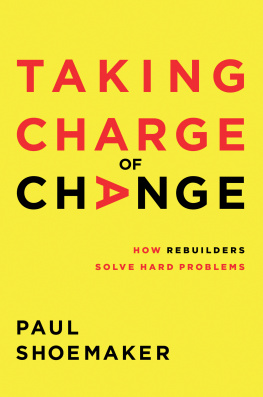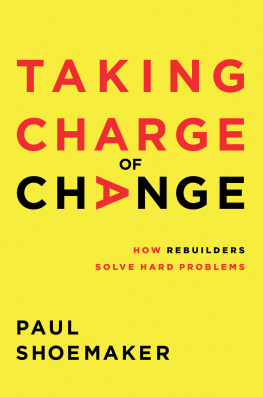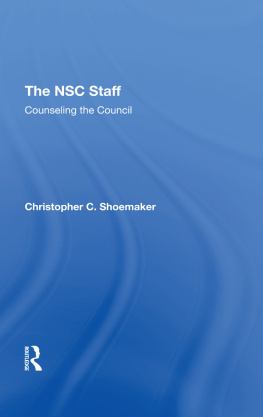Paul Shoemaker - Taking Charge of Change
Here you can read online Paul Shoemaker - Taking Charge of Change full text of the book (entire story) in english for free. Download pdf and epub, get meaning, cover and reviews about this ebook. year: 2021, publisher: Harpercollins Leadership, genre: Politics. Description of the work, (preface) as well as reviews are available. Best literature library LitArk.com created for fans of good reading and offers a wide selection of genres:
Romance novel
Science fiction
Adventure
Detective
Science
History
Home and family
Prose
Art
Politics
Computer
Non-fiction
Religion
Business
Children
Humor
Choose a favorite category and find really read worthwhile books. Enjoy immersion in the world of imagination, feel the emotions of the characters or learn something new for yourself, make an fascinating discovery.
- Book:Taking Charge of Change
- Author:
- Publisher:Harpercollins Leadership
- Genre:
- Year:2021
- Rating:3 / 5
- Favourites:Add to favourites
- Your mark:
- 60
- 1
- 2
- 3
- 4
- 5
Taking Charge of Change: summary, description and annotation
We offer to read an annotation, description, summary or preface (depends on what the author of the book "Taking Charge of Change" wrote himself). If you haven't found the necessary information about the book — write in the comments, we will try to find it.
Taking Charge of Change — read online for free the complete book (whole text) full work
Below is the text of the book, divided by pages. System saving the place of the last page read, allows you to conveniently read the book "Taking Charge of Change" online for free, without having to search again every time where you left off. Put a bookmark, and you can go to the page where you finished reading at any time.
Font size:
Interval:
Bookmark:
Information about External Hyperlinks in this ebook
Please note that the endnotes in this ebook may contain hyperlinks to external websites as part of bibliographic citations. These hyperlinks have not been activated by the publisher, who cannot verify the accuracy of these links beyond the date of publication
Lori, my soulmate for life,
whos taught me how to lead by listening a thousand times
Sam, Nick, and Ben,
who inspire their dad to try to make them proud every day
And the thirty-eight Rebuilders in this book,
who helped me reimagine leadership for the future
2021 Paul Shoemaker
All rights reserved. No portion of this book may be reproduced, stored in a retrieval system, or transmitted in any form or by any meanselectronic, mechanical, photocopy, recording, scanning, or otherexcept for brief quotations in critical reviews or articles, without the prior written permission of the publisher.
Published by HarperCollins Leadership, an imprint of HarperCollins Focus LLC.
Any internet addresses, phone numbers, or company or product information printed in this book are offered as a resource and are not intended in any way to be or to imply an endorsement by HarperCollins Leadership, nor does HarperCollins Leadership vouch for the existence, content, or services of these sites, phone numbers, companies, or products beyond the life of this book.
ISBN 978-1-4002-2170-7 (eBook)
ISBN 978-1-4002-2169-1 (HC)
Epub Edition January 2021 9781400221707
Library of Congress Control Number: 2020951998
Printed in the United States of America
20 21 22 23 LSC 10 9 8 7 6 5 4 3 2 1
Rosanne Haggertys story goes like thisshortly after college, the building next door to where she lived in New York City was known as Homeless Hell. The building had descended into chaos and bankruptcy and was a temporary shelter for homeless families. Also living there were two hundred longtime elderly residents and people with mental illness. The building was rife with drug selling and prostitution. She tried to interest housing groups in saving the building, but no one believed it could be transformed. Haggerty decided to leave her work and take on the mission.

Rosanne Haggerty
In 1990, she started an organization, Common Ground, to demonstrate solutions to homelessness at scale. In the following twenty years, they created nearly three thousand new homes in creatively financed buildings in and around New York City, which assisted 4,500 lower-income and homeless individuals. She also knew that homelessness was continuing to rise.
Homelessness does not discriminate by geography. It occurs from urban centers to suburbs to rural regions. Homelessness in rural settings is often hidden, unlike the more visible street homeless in urban areas. The homelessness challenge directly affects nonprofit, public, and private sectors because of its impact on quality of life, public safety, and economic development, not to mention public health and personal endangerment.
Given that Common Ground (now named Breaking Ground) hadnt stopped homelessness from increasing, in 2011, Haggerty founded Community Solutions to help communities across the United States end homelessness. Just four years later, their 100,000 Homes Campaign exceeded its goal by housing more than 105,000 Americans, a phenomenal accomplishment. Yet at the conclusion of that effort, she could not escape the stark fact that none of the communities involved had ended homelessness. She was trying to climb a mountain that kept getting steeper with a summit that kept getting higher.
If you dont know Rosanne Haggerty, at this point you might assume that because she gave it an incredibly admirable effort, doing more than just about anyone else ever had, she would feel disheartened or disgruntled. If she felt any of those feelings, it didnt stop her. In her very humble way, Rosanne Haggerty is pretty steely-eyed.
In 2015, she and Community Solutions launched Built for Zero, a movement that has finally proven that, when the right conditions are met, communities can measurably end chronic and veteran homelessness (what they call functional zero). So, what is one of the hardscrabble, on-the-street, bare-knuckles keys to finally making progress on one of Americas most visible, gritty, and seemingly intractable problems? In her own words, a Generosity Mindset.
How do you end chronic homelessness in eleven communities across America, like Arlington, Virginia; Riverside, California; and Chattanooga, Tennessee? And how do you end veteran homelessness in Bergen County, New Jersey; Lancaster, Pennsylvania; and Rockford, Illinois?
Apparently by
- creating a commitment to unity and looking for what you can commonly share while respecting one anothers differences;
- leaving room for multiple points of view; and
- finding your edge of discomfort as a leader, just as a rock climber does, pushing beyond your percieved boundaries in order to lead diverse people.
And by doing all these things, a city will be in relationship around a shared, nonpartisan community goal and you will create a powerful shared truth, like knowing the names and identities of each homeless person, so its personal to everyone. Thats what a Generosity Mindset looks like, and thats how to fight one of the most complex, perplexing civic challenges in America. Haggerty can hold that generosity even in the midst of such complexity.
Ive hung out in quite a few meetings and conversations with her over the last few years. I dont know that I would have understood what a Generosity Mindset meant when I first met her. Over time, it became more and more clear. She believes in and is looking for others who believe with her. She keeps an even keel at all times; thats her makeup. She leads by bringing everyone in and making sure the work moves at the speed of trust. And she leads through a strategically and intentionally generous mindset.
Haggerty has accrued just about every award and fellowship you possibly could in the social sector. She is also an exemplar of a new kind of leader America will need more and more of in our future, starting right now. Shes a Rebuilder.
When I was in first and second grade, growing up in Fort Dodge, Iowa, Snell-Crawford Park was just a few hundred feet from our backyard. In the hot, humid summers, Id take off into the woods, try to avoid the poison ivy, and walk along Soldier Creek. Somewhere along the trail was a small, simple arch bridge with a road running over the creek. Id sit underneath that bridge and wait for cars to go rumbling over. Even with a bridge that simple, I was sort of fascinated by how a structure could hold up a whole concrete street with cars speeding across.

Bridges across the United States in 2020 are deteriorating. A recent report estimates that it will take more than eighty years to fix all of them. There are more than 600,000 bridges in America, and 235,000 of them need some sort of repair. Thats almost 40 percent. Nearly 8 percent, 46,000 are structurally deficient and in need of urgent rebuilding.
The state of our deteriorating, structurally deficient bridges in 2020 is an evocative metaphor for the nation we are living in right now. The social, economic, and health structures underlying American civil society are in a more critical condition than they have been in decades.
Font size:
Interval:
Bookmark:
Similar books «Taking Charge of Change»
Look at similar books to Taking Charge of Change. We have selected literature similar in name and meaning in the hope of providing readers with more options to find new, interesting, not yet read works.
Discussion, reviews of the book Taking Charge of Change and just readers' own opinions. Leave your comments, write what you think about the work, its meaning or the main characters. Specify what exactly you liked and what you didn't like, and why you think so.











